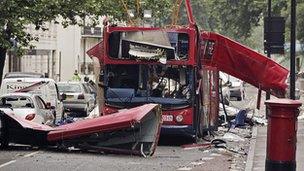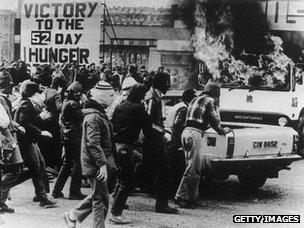Waiting for an answer on how victims will be treated
- Published
- comments
Some Stormont stories are fast moving, others take rather longer to develop.
Many assembly members complain about the length of time it takes departments to answer their queries. Here's an example of a journalist's question making its way through the system rather more slowly than the average mollusc.

More than 50 people died and hundreds were injured in the 7/7 attacks in London
Around the end of November, the East Belfast Ulster Unionist MLA Michael Copeland complained to me that the welfare legislation under consideration at the Assembly was a "copy and paste job" which had simply been imported from Westminster in its entirety.
As an illustration of what he was talking about, Mr Copeland pointed to a clause in the legislation dealing with the kind of deductions which might be made from any payments of the new Universal Credit to a claimant.
Universal Credit is replacing six existing benefits including Income Support. It is expected to be introduced into Northern Ireland from April next year.
The legislation now making its way through the Assembly makes it clear that if a claimant has unearned income this will, in most cases, be taken into account whenever the level of Universal Credit to which they are entitled is calculated.
However, the regulations attached to the legislation also specify particular kinds of income which will not be taken into account when deciding on such benefit deductions.
Those special cases include compensation payments made in relation to a diagnosis of the degenerative Creutzfeldt-Jacob brain disease, infection from contaminated blood products, to holders of the Victoria and George Crosses, and to victims of the 2005 London bombings.
Michael Copeland didn't want these exemptions removed from the welfare regulations.

It is not clear if victims of the Troubles will have the same compensation arrangements
But he argued that - in comparison to the 2005 London bombings - the Social Development department had given "no similar consideration to the victims of atrocities committed against the citizens of Northern Ireland".
Mr Copeland described this as "a shocking example of how little effort the DSD have taken to put their own stamp on this proposed legislation".
On 3 December, I asked the department for a response, querying whether there were any plans for special consideration to be built into the local welfare legislation for compensation payments made to victims of the Troubles.
Later that day Belfast City Council took its controversial vote on the Union flag and the welfare story receded on my list of priorities.
But late last month I remembered I never got an answer from the DSD. So, nearly two months after asking my original question, I gave the department another nudge.
Last week the DSD explained to me that it had decided to duplicate the exemption for London bombing compensation in the local welfare regulations in case "anybody affected either lives or moves to Northern Ireland".
On whether any similar exemptions might apply to Troubles victims, a department spokesperson said "relevant issues" were being discussed with the Victims Commissioner and other meetings were being arranged "to ensure that real action is taken to understand how the reforms will impact on local people".
Since that did not directly answer my question I turned to the Victims Commissioner's Office, who told me there would be further meetings between the minister, Nelson McCausland, and the Commission to discuss "issues relevant to victims and survivors... including that of compensation payments".
So two and half months on from setting out on this quest, I still don't know whether the Department of Social Development will treat Troubles victims in Northern Ireland on a par with victims of the 2005 London bombings.
However, if there's a breakthrough, on the basis of the time it's taken me to get this far, I'm sure I'll be the last to know.